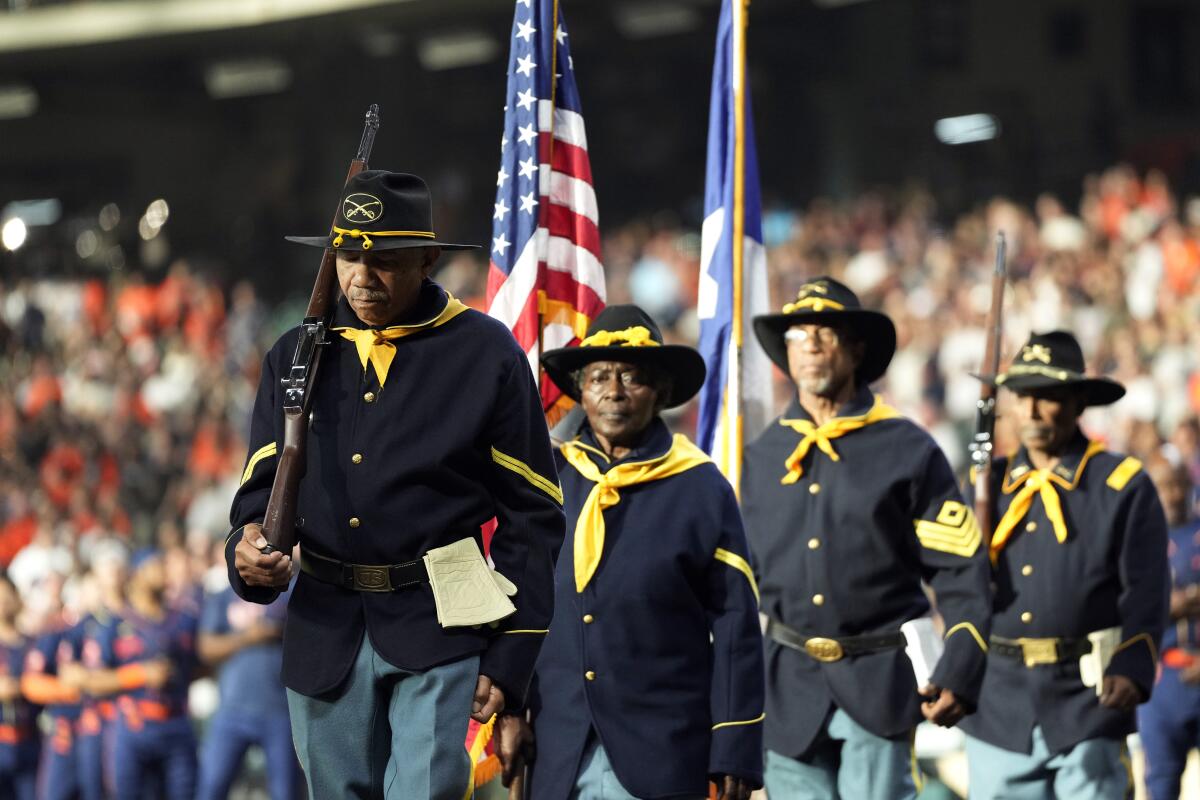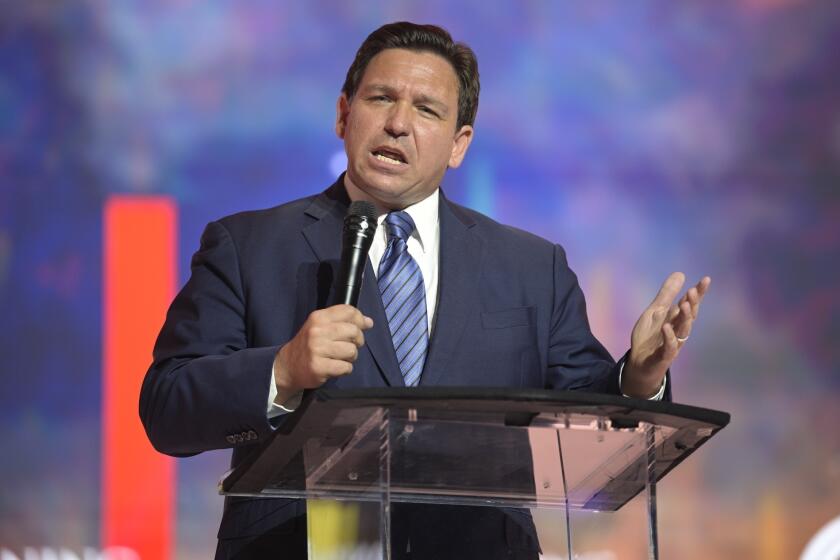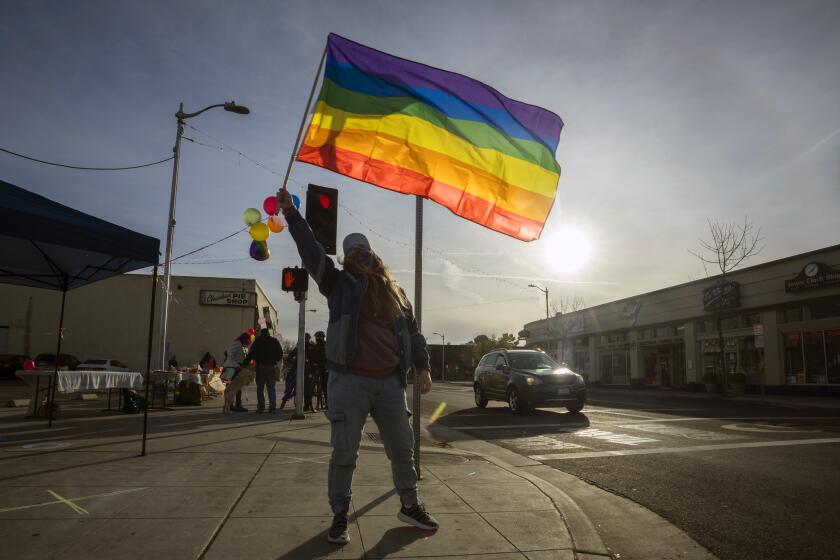Column: What to Black Americans is the Fourth of July?

There are lots of great Fourth of July speeches from American history. At the top of my list is a keynote address delivered by one of my favorite Republicans: Frederick Douglass.
The abolitionist spoke at an Independence Day celebration at the historic Corinthian Hall in Rochester, N.Y. It was July 5, 1852. The United States of America had just turned 76 years old. Abraham Lincoln was still a lobbyist for the Illinois Central Railroad at the time. About half of the states still allowed slavery.
Opinion Columnist
LZ Granderson
LZ Granderson writes about culture, politics, sports and navigating life in America.
That’s where the nation was when Douglass, who had escaped enslavement in 1838, said this to the Rochester Ladies’ Anti-Slavery Society:
“The blessings in which you, this day, rejoice, are not enjoyed in common. The rich inheritance of justice, liberty, prosperity and independence, bequeathed by your fathers, is shared by you, not by me. The sunlight that brought life and healing to you, has brought stripes and death to me. This Fourth of July is yours, not mine. You may rejoice, I must mourn.”
More than a decade would go by after Douglass delivered those remarks before President Lincoln would issue the Emancipation Proclamation, in a nation by then embroiled in civil war. By the end of the war, the U.S. had celebrated 88 birthdays while the brutal enslavement of human beings was the law of the land. Hence the title of Douglass’ speech: “What to the Slave Is the Fourth of July?”
That’s not woke, mind you.
That’s just what happened.
“Woke” would be the speech Douglass delivered in April 1865, a few days before the Civil War ended.
Texas pioneered this horror show before Florida joined, and the scare tactics work. They can discourage voters, spook donors and derail campaigns.
This was in Boston for the Massachusetts Anti-Slavery Society, an organization with which he had worked closely throughout the years. With Union victory looming, the group was discussing disbanding as many leaders considered their mission complete. The end of slavery in Texas — now known as Juneteenth — would not come for another two months, so these leaders were declaring victory before the war was over and while 250,000 people remained enslaved in Texas.
This is what led Douglass to speak out against disbanding. In his speech “What the Black Man Wants,” he encouraged attendees to redirect the organization’s energy toward voting rights:
“Without this, his liberty is a mockery; without this, you might as well almost retain the old name of slavery for his condition; for in fact, if he is not the slave of the individual master, he is the slave of society, and holds his liberty as a privilege, not as a right. He is at the mercy of the mob, and has no means of protecting himself.”
The Republican Party is making its anti-LGBTQ agenda quite clear and presenting voters with a stark choice.
Douglass understood that without the vote, there was no agency. And where there’s no agency, there is no independence. Still, almost five years would go by before passage of the 15th Amendment in 1870 gave Black men the vote. Nearly a century would go by before the Voting Rights Act of 1965 brought real protections to ensure people could exercise their right to vote. Between 1865 and 1965, Black people were no longer enslaved but, according to Douglass, not quite free.
I know this is a little heavy for the holiday. But the Supreme Court just outlawed affirmative action in college admissions, under the pretense that America is race neutral.
As if everything you just read can be nullified via 60 years of an imperfect policy.
President Lincoln and President Kennedy, who signed affirmative action into law in 1961, were both assassinated after trying to help Black people. The socioeconomic gap between the races still looks very much as it did when Kennedy was alive. “Race neutral” refers to a time that has yet to be recorded in American history.
Of course Douglass had already told us what will really reveal how “race neutral” America is: the vote.
Here’s an idea for lawmakers who fear critical race theory and don’t want to be plagued with white guilt: Teach about heroic white abolitionists as well as white enslavers.
In rejecting the theory that state legislatures have the power to set election rules without much oversight, the Supreme Court put some constraints on partisan gerrymandering last week. Welcome news. Apparently North Carolina was at it again, after a judge found in 2016 that Republican lawmakers there had discouraged Black voters with “almost surgical precision.”
Unfortunately the Tar Heels are hardly alone. Last year, GOP presidential candidate Gov. Ron DeSantis of Florida created an election police force that miraculously kept finding Black people to harass. The year before that, Gov. Greg Abbott of Texas signed a congressional map with zero Black districts despite Texas having the largest Black population in the country. And don’t forget those lawsuits alleging fraud in the 2020 election in counties with the most people of color.
Again, not woke.
Just what happened.
And what’s still happening.
The wishful thinking just won’t quit either. Back in 2003, while denouncing affirmative action in a dissenting opinion, Justice Clarence Thomas made a twisted reference to Douglass’ “What the Black Man Wants.” Ridiculous. Even 20 years ago, as a frightened country openly discriminated against Muslim Americans and people from the Middle East after 9/11, Thomas was out touting America as race neutral. Much in the way abolitionists in Boston were claiming victory over slavery while Black people couldn’t vote and 250,000 Black Americans were still in chains in Texas.
On July 4, 1776, there was freedom for some. Juneteenth ended slavery as an official policy, but freedom took significantly longer. Both dates were important steps for democracy and for Americans’ independence, and neither signified “mission accomplished.”
Recognizing this doesn’t mean you hate the Fourth of July. It just means you’re tired of lying about it.
More to Read
A cure for the common opinion
Get thought-provoking perspectives with our weekly newsletter.
You may occasionally receive promotional content from the Los Angeles Times.















